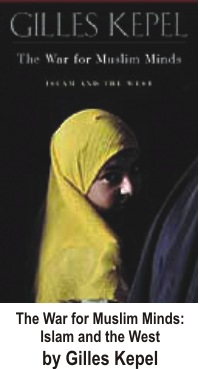|
Book
Review
The missing peace
William
Dalrymple
 Reading
Gilles Kepel's important book, it is easy to see why al-Qaida
should be so enthusiastic about Bush. Bin Laden has always
been open about his aims: by unleashing a clash of civilisations
between Islam and the "Zionist-Crusaders" of the
west, he hopes to provoke an American backlash strong enough
to radicalise the Muslim world, topple pro-western governments
and so install a new Islamic caliphate. Reading
Gilles Kepel's important book, it is easy to see why al-Qaida
should be so enthusiastic about Bush. Bin Laden has always
been open about his aims: by unleashing a clash of civilisations
between Islam and the "Zionist-Crusaders" of the
west, he hopes to provoke an American backlash strong enough
to radicalise the Muslim world, topple pro-western governments
and so install a new Islamic caliphate.
Bush has
fulfilled Bin Laden's every hope. Through the invasion of
secular Ba'athist Iraq, the abuses in Abu Ghraib, the mass-murders
in Faluja, America, with Britain's obedient assistance, has
turned Iraq into a jihadist playground while alienating all
moderate Muslim opinion. We may have failed to capture Bin
Laden, but we have succeeded in liberating the extremists,
radicalising the unaffiliated and making life more difficult
than ever for our natural allies: ordinary, decent, moderate
Muslims.
Not least
of the virtues of Kepel's book is that it provides in translation
a huge amount of al-Qaida source material, such as Ayman al-Zawahiri's
lengthy text Knights under the Prophet's Banner, which lays
out in full al-Qaida's political programme. According to al-Zawahiri,
he and Bin Laden agreed that the failure to mobilise the Muslim
masses could only be reversed by an attack of the scale of
9/11, so convincing Muslims of the "irresistible power"
of their movement.
Kepel
argues that al-Qaida is not some structured multi-national.
Instead it barely exists: "al-Qaida was less a military
base of operations than a database that connected jihadists
around the world via the internet." As Kepel shows, this
failure to understand the nature of al-Qaida was the reason
that the US attempted to counter it with such unsuitable policies
- so inadvertently turning itself into al-Qaida's most effective
recruiting agency.
Kepel
emphasises the centrality of Palestine to this equation. From
Bin Laden's first public statement, "A Declaration of
War Against the Americans", issued in 1996, he announced
he was fighting US foreign policy in the Middle East and in
particular American support for the House of Saud and the
state of Israel. In Knights Under the Prophet's Banner, al-Zawahiri
emphasises that it was the failure of Oslo, the eruption of
the second intifada in the autumn of 2000, and the repressive
campaign waged by Ariel Sharon that provided the opportunity
al-Qaida had been waiting for: here was the rallying cry that
could unify the Muslim world. All that was needed was a massive
strike, and the US system in the Middle East would begin to
unravel.
If Bin
Laden was obsessed with Israel, it was no less the central
concern of the neocons to whom President Bush turned in the
aftermath of 9/11. Kepel lays out very clearly the methods
the neocons used to hijack Bush's "war on terror"
to pursue their own pre-existing agenda. This consisted of
abandoning the Oslo peace accords and instead seeking security
for Israel by eliminating the Arab regimes which threatened
it - ironically a goal which the neocons shared with al-Qaida.
Ideas
originally produced in 1996 for a Likud thinktank by Douglas
Feith and Richard Perle under the title "A Clean Break:
A New Strategy for Securing the Realm", were later adapted
in Washington for the neocon's "Project for the New American
Century" (about which, alarmingly, Tony Blair recently
professed ignorance: "What is it?" he asked James
Naughtie). These ideas went on to become official US- and
by default British - policies following 9/11.
Kepel
also emphasises the central role that Saudi Arabia has played
in the nurturing of violent political Islam - and the degree
to which the Wahhabi kingdom took in Islamist leaders expelled
by the region's secular regimes such as Syria, Egypt and Iraq.
It was in Saudi Arabia, and among Saudis engaged in the Afghan
jihad, that the fatal fusion took place between ultra-orthodox
Salafism and the jihadi ideas of the Muslim Brothers. Yet
while Saudi Arabia continues to be regarded as a US ally,
it was the Ba'athist regimes that were mainly targeted by
the neocons.
The battle
is now on for the hearts and minds of ordinary Muslims - a
battle the US is catastrophically losing. The Islamists have
proved surprisingly adept at PR and have used the internet
and the Arab satellite channels with great skill. In this
battle, the way that Europe's million Muslims swing will prove
crucial. If suspicion and Islamophobia drives them into the
embrace of the militants, we are lost. Yet Kepel ends his
book on a note of hope. Across Europe, a new generation of
Muslims is becoming active in democratic politics. Kepel hopes
that with a fair wind, these European Muslims could yet "present
a new face of Islam - reconciled with modernity - to the larger
world."
This
review was first published in the Guardian
Copyright
(R) thedailystar.net 2004
| 